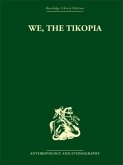Originally published in 1970, this book represents a unique study of beliefs and ritual practices in a pagan religion, and of the processes by which a transformation to Christianity took place.
Christianity came to the major islands of Polynesia nearly two centuries ago, and within a couple of generations, the traditional pagan religion had disappeared. Only a few remote islands such as Tikopia preserved their ancient cults.
Over eighty years ago, the author first observed and took part in these pagan rites, and on later visits he studied the change from paganism to Christian faith. Unique in its rich documentation, this book presents a systematic account of the traditional beliefs in gods and spirits and of the way in which these were fused with the social and political structure. The causes and dramatic results of the conversion to Christianity are then described, ending with an examination of the religious situation at the time of the book's original publication.
The book is both a contribution to anthropology and a case study in religious history. It completes the major series of studies of Tikopia society for which the author is famous. It gives the first full account of a Polynesian religious system in a state of change.
Christianity came to the major islands of Polynesia nearly two centuries ago, and within a couple of generations, the traditional pagan religion had disappeared. Only a few remote islands such as Tikopia preserved their ancient cults.
Over eighty years ago, the author first observed and took part in these pagan rites, and on later visits he studied the change from paganism to Christian faith. Unique in its rich documentation, this book presents a systematic account of the traditional beliefs in gods and spirits and of the way in which these were fused with the social and political structure. The causes and dramatic results of the conversion to Christianity are then described, ending with an examination of the religious situation at the time of the book's original publication.
The book is both a contribution to anthropology and a case study in religious history. It completes the major series of studies of Tikopia society for which the author is famous. It gives the first full account of a Polynesian religious system in a state of change.








